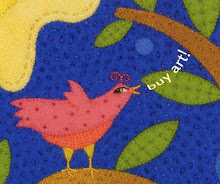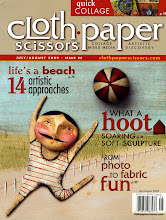I've got a bit of a problem.
Okay, it's a whopper, actually. An epic struggle. Like I'm trapped under an enormous rock.
Luckily I can still barely wiggle one finger.
I'm using it to type this post.
The problem is not as simple as a rock, however. It is infinitely more complex. The most basic components consist of a house that refuses to be sold, a studio that is unable to be used, a life that is in what seems to be a permanent state of limbo...and all the accompanying psychic distress.
Things were iffy in the world of high-end fine craft before all this started, of course. Which doesn't help.
The result is, I can't work, and even if I could,
would I have the wherewithal to do so? Not sure.
I do know I can eat candy, exercise in a losing battle to combat the all-candy diet, and clean house. And read books in my pajamas. And watch Arrested Development -- it's only funny the first 400 times, btw...
That's about it.
All my friends and loved ones have wisely pointed out that this time is a gift. That this is my chance to finally (finally!) devote myself to writing. They are right, of course. But for some reason, their well intentioned counsel feels like they just set another rock on top of the enormous rock. And then all climbed on top to stand on it while they wait for me to start typing.
So it felt like a tiny little shred of grace today when I came across this article on Think Jar Collective. It focuses on Richard Feynman, a Nobel prize winning physicist who obviously knew a thing or two about how things work. This excerpt from his writing provided me a bit of hope.
Then I had another thought: Physics disgusts me a little bit now, but I used to enjoy doing physics. Why did I enjoy it? I used to play with it. I used to do whatever I felt like doing – it didn’t have to do with whether it was important for the development of nuclear physics, but whether it was interesting and amusing for me to play with. When I was in high school, I’d see water running out of a faucet growing narrower, and wonder if I could figure out what determines that curve. I found it was rather easy to do. I didn’t have to do it; it wasn’t important for the future of science; somebody else had already done it. That didn’t make any difference. I’d invent things and play with things for my own entertainment.
So I got this new attitude. Now that I am burned out and I’ll never accomplish anything, I’ve got this nice position at the university teaching classes which I rather enjoy, and just like I read the Arabian Nights for pleasure, I’m going to play with physics, whenever I want to, without worrying about any importance whatsoever.
Within a week I was in the cafeteria and some guy, fooling around, throws a plate in the air. As the plate went up in the air I saw it wobble, and I noticed the red medallion of Cornell on the plate going around. It was pretty obvious to me that the medallion went around faster than the wobbling.
I had nothing to do, so I start to figure out the motion of the rotating plate. I discover that when the angle is very slight, the medallion rotates twice as fast as the wobble rate. Then I thought, “Is there some way I can see in a more fundamental way, by looking at the forces or the dynamics?”
I don’t remember how I did it, but I ultimately worked out what the motion of the mass particles is, and how all the accelerations balance… I still remember going to Hans Bethe and saying, “Hey, Hans! I noticed something interesting. Here the plate goes around so, and the reason it’s two to one is …” and I showed him the accelerations.
He says, “Feynman, that’s pretty interesting, but what’s the importance of it? Why are you doing it?”
“Hah!” I say. “There’s no importance whatsoever. I’m just doing it for the fun of it.” His reaction didn’t discourage me; I had made up my mind I was going to enjoy physics and do whatever I liked.
It was effortless. It was easy to play with these things. It was like uncorking a bottle: Everything flowed out effortlessly. I almost tried to resist it! There was no importance to what I was doing, but ultimately there was. The diagrams and the whole business that I got the Nobel Prize for came from that piddling around with the wobbling plate.
-- Richard Feynman (1918-1988)[Feynman, R. (1985). Surely you’re joking, Mr. Feynman, pg. 157-158]
So now I'm going to take that little bit of hope and fire up my new (to me) mac laptop, graciously provided me by my daughter who believes in my writing dreams. And I'm going to play for a bit, and see if I can't lighten things up. Try to somehow shift it from something that adds pressure to something that can alleviate it.
These are my old friends words we're talking about, after all. We have known each other a long time.
(Now if someone wants to come along
and lift the house off my back,
that would be okay too.)
I'll keep you posted.



























